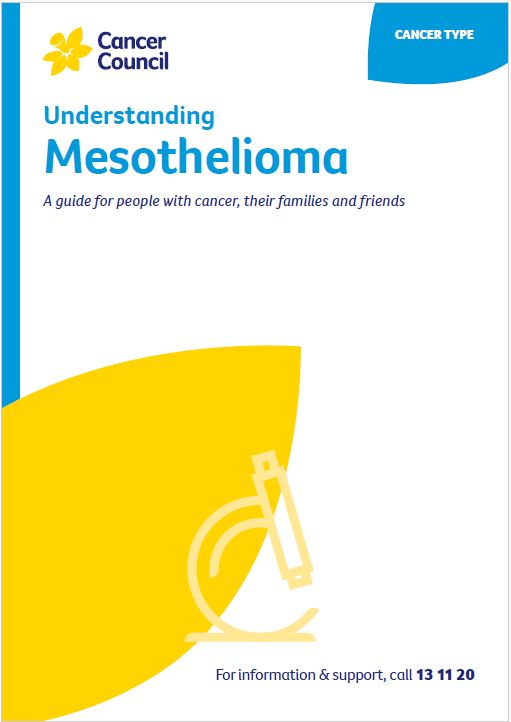- Home
- Peritoneal mesothelioma
- Treatment
- Making treatment decisions
Making treatment decisions
Learn how to make informed decisions about treatment options for peritoneal mesothelioma to ensure the best possible outcome.
Learn more about:
- Overview
- Knowing your options
- Recording the details
- Asking questions
- Considering a second opinion
- It’s your decision
- Should I join a clinical trial?
- Video: What are clinical trials?
Overview
Sometimes it is difficult to decide on the type of treatment to have. You may feel that everything is happening too fast, or you might be anxious to get started.
Check with your specialist how soon treatment should begin, as it may not affect the success of the treatment to wait a short time. Ask them to explain the options, and take what time you can before making a decision.
Know your options
Understanding the disease, the available treatments, possible side effects and any extra costs can help you weigh up the options and make a well-informed decision.
Check if the specialist is part of a multidisciplinary team and if the treatment centre is the most appropriate one for you – you may be able to have treatment closer to home, or it might be worth travelling to a centre that specialises in a particular treatment.
Record the details
When your doctor first says you have cancer, you may not remember everything you are told. Taking notes can help. If you would like to record the discussion, ask your doctor first. It is a good idea to have a family member or friend go with you to appointments to join in the discussion, write notes or simply listen.
Ask questions
If you are confused or want to check anything, it is important to ask your specialist questions. Try to prepare a list before appointments. If you have a lot of questions, you could talk to a cancer care coordinator or nurse.
Consider a second opinion
You may want to get a second opinion from another specialist to confirm or clarify your specialist’s recommendations or reassure you that you have explored all of your options. Specialists are used to people doing this.
Your GP or specialist can refer you to another specialist and send your initial results to that person. You can get a second opinion even if you have started treatment or still want to be treated by your first doctor. You might decide you would prefer to be treated by the second specialist.
It’s your decision
Adults have the right to accept or refuse any treatment that they are offered. For example, some people with advanced cancer choose treatment that has significant side effects even if it gives only a small benefit for a short period of time. Others decide to focus their treatment on quality of life. You may want to discuss your decision with the treatment team, GP, family and friends.
For more on this, see Cancer care and your rights
Should I join a clinical trial?
Your doctor or nurse may suggest you take part in a clinical trial. Doctors run clinical trials to test new or modified treatments and ways of diagnosing disease to see if they are better than current methods.
For example, if you join a randomised trial for a new treatment, you will be chosen at random to receive either the best existing treatment or the modified new treatment. Over the years, trials have improved treatments and led to better outcomes for people diagnosed with mesothelioma.
You may find it helpful to talk to your specialist, clinical trials nurse or GP, or to get a second opinion. If you decide to take part in a clinical trial, you can withdraw at any time.
For more information, see Clinical trials and research. To find current clinical trials near you, visit Cancer Institute NSW or Australian Cancer Trials.
→ READ MORE: Surgery for peritoneal mesothelioma
Video: What are clinical trials?
Medical Oncologist Dr Elizabeth Hovey explains what clinical trials are and how they can improve cancer treatment.
Podcast: Making Treatment Decisions
Listen to more episodes from our podcast for people affected by cancer
More resources
All updated content has been clinically reviewed by A/Prof Anthony Linton, Medical Oncologist, Concord Cancer Centre and Concord Repatriation General Hospital, NSW; Dr Naveed Alam, Thoracic Surgeon, St Vincent’s Private Hospital Melbourne and Monash Medical Centre, VIC; Prof David Morris, Peritonectomy Surgeon, St George Hospital and UNSW, NSW. This edition is based on the previous edition, which was reviewed by the following panel: A/Prof Anthony Linton (see above); Dr Naveed Alam, (see above); Donatella Arnoldo, Consumer; Polly Baldwin, 13 11 20 Consultant, Cancer Council SA; Dr Melvin (Wee Loong) Chin, Medical Oncologist, Sir Charles Gairdner Hospital and National Centre for Asbestos Related Diseases, WA; Prof Kwun Fong, Thoracic and Sleep Physician and Director, UQ Thoracic Research Centre, The Prince Charles Hospital, and Professor of Medicine, The University of Queensland, QLD; Vicki Hamilton OAM, Consumer and CEO, Asbestos Council of Victoria/ GARDS Inc., VIC; Dr Susan Harden, Radiation Oncologist, Peter MacCallum Cancer Centre, VIC; Penny Jacomos, Social Worker, Asbestos Diseases Society of South Australia, SA; Prof Brian Le, Director, Parkville Integrated Palliative Care Service, The Royal Melbourne Hospital and Peter MacCallum Cancer Centre, VIC; Lung Cancer Support Nurses, Lung Foundation Australia; Jocelyn McLean, Mesothelioma Support Coordinator, Asbestos Diseases Research Institute, NSW; Prof David Morris (see above); Joanne Oates, Registered Occupational Therapist, Expert Witness in Dust Diseases, and Director, Evaluate, NSW; Chris Sheppard and Adam Barlow, RMB Lawyers.
View the Cancer Council NSW editorial policy.
View all publications or call 13 11 20 for free printed copies.

